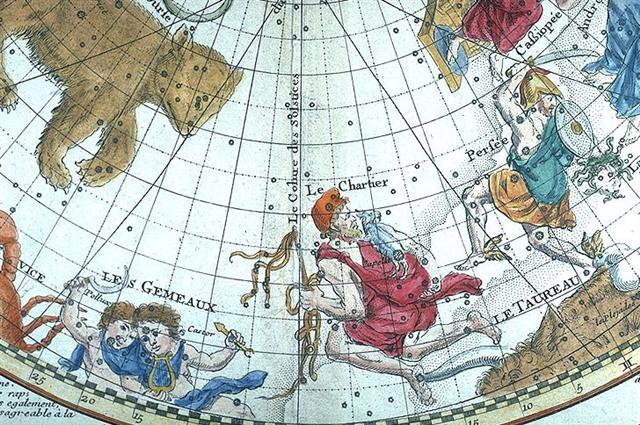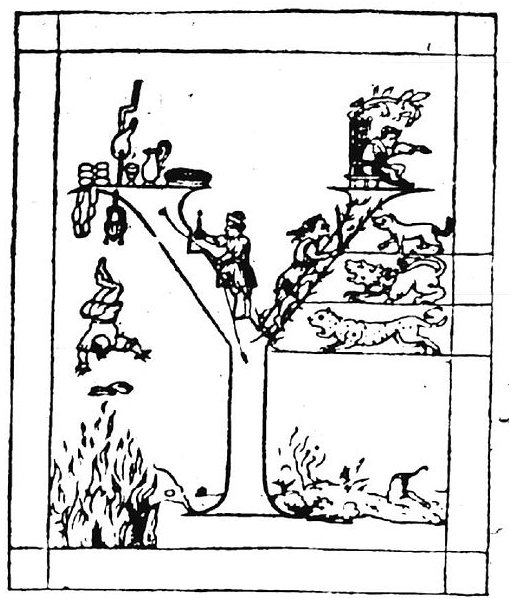A
pair of extra long months should be added to the ancient 10.
There was no final dot at the end of the name for the 10th taro
variant - the sequence went on.
|
10 + 2 variants of taro
brought by Oti from the plantation of
Teke: |
|
1 |
*70 |
ngeti uri. |
a Teke. a Oti. |
|
2 |
*71 |
ngeti tea. |
|
3 |
*72 |
he ngaatu. |
|
4 |
*73 |
he tuitui koviro. |
|
5 |
*74 |
he ketu anga mea. |
|
6 |
*75 |
he ketu takarua. |
|
7 |
*76 |
he teatea. |
|
8 |
*77 |
he ngu haha tea. |
|
9 |
*78 |
he mango. |
|
10 |
*79 |
he hahara rapanui |
|
1 |
*80 |
he ti. |
|
1 |
*81 |
he kape. |
... Teke said to Oti, 'Send
the men [ka unga te tangata] for banana
shoots. They shall take all kinds of banana
shoots [anakeanake.te huru o te maika]
from my banana plantation, also taro, all kinds
of taro, furthermore ti (Cordyline fruticosa)
and kape (Alocasia macrorrhiza).' Oti and
all his assistants went away, arrived, and took
some of the banana shoots as well as taro, ti,
and kape. [E:67]
|
1 he
ti. |
1
he kape. |
|
Ti
by lying with Tattooing made the
ti plant (he ti ki ai ki roto
ki a he ta ka pu te ti). Burnt
ti leaves were used to
produce the black dye for tattooing.
... To
be in heat, to copulate, to embrace;
concupiscence, fornication,
impurity; lascivious, impure (ai)
...

Kape.
'Bitter-taro' (Alocasia
macrorrhiza). In 1957 kape
was still cultivated in much the
same way as dry taro. It is a type
of food to be eaten during times of
famine. According to Fuentes
(1960:856), the tubers had to be
kept in the earth-oven for 15 (sic)
days in order to eliminate some of
the poisonous components. Barthel
2. Arum, yam. Churchill.
Bitterness
by doing it with Bad-taste produced
the kape (mangeongeo ki ai
ki roto he rakerake ka pu te kape). |
|
APRIL 6 (96 = 3 * 32) |
7
(*17) |
 |
 |
|
Ga1-16 |
Ga1-17 |
|
Shur-narkabti-sha-iltanu-5 (Star in
the Bull towards the north)
σ
Aurigae (80.4),
BELLATRIX (Female Warrior)
=
γ
Orionis,
SAIF AL JABBAR (Sword of the Giant)
=
η
Orionis
(80.7),
ELNATH (The Butting One)
=
β
Tauri = γ Aurigae
(80.9)
*39.0 = *80.4 - *41.4 |
ψ
Orionis (81.1),
NIHAL (Thirst-slaking Camels)
=
β
Leporis
(81.7) |
 |
|
June 9 (*445 = *365 + *80) |
10 (161) |
|
... The month, which takes its name
from Juppiter the oak-god, begins on
June 10th and ends of July 7th.
Midway comes St. John's Day, June
24th, the day on which the oak-king
was sacrificially burned alive. The
Celtic year was divided into two
halves with the second half
beginning in July, apparently after
a seven-day wake, or funeral feast,
in the oak-king's honour
...
 |
|
°June 5 (156) |
6
(*77) |
|
'May 13 |
14 (*54) |
|
"April 29 (*39) |
Vaitu
Nui 30 |
|
CLOSE TO THE FULL MOON: |
|
OCT 6 (279 = 9 * 31) |
7
(*200) |
|
β, γ Arae (263.3), κ Arae (263.5), σ
Ophiuchi (263.6) |
LESATH (Sting)
=
υ
Scorpii,
δ
Arae (264.7),
CHOO (Club) =
α
Arae
(264.9) |
|
Dec 9 (343 = 7 * 49 = 279 + 8 * 8) |
10 (161 + 183) |
|
°Dec 5 (339) |
6
(*260) |
|
'Nov 12 (*236 = 8 * 29½) |
13 (317 = 161 + 12 * 13) |
|
"Oct 29 (*222) |
Tangaroa Uri
30 |
|
... Page E:86 tells about
Makoi being left behind on
Easter Island when the remaining
5 Explorers sailed home to
Hiva. From there (Tangaroa
Uri 25) to the day when king
Hotu became worried about
where king Oto Uta was,
i.e. in Tangaroa Uri 30,
there were 5 days:
|
April
25 (115) |
5
+ 56 |
June
25 (176) |
5 +
116 |
Oct
25 (298) |
5
+ 56 |
Dec
25 (359) |
5 +
116 |
|
61 |
2 *
61 |
61 |
2 *
61 |
|
183 |
183 |
|
366 =
2 * 183 = 6 * 61 |
And from the autumn equinox
(265) at Antares to the Sting of
the Scorpion (υ
Scorpii) there were 15 days
...
 |
|
Egyptian sky pillar |
 |
Phoenician waw |
 |
Greek upsilon |
Υ(υ) |
|
... Upsilon
(uppercase Υ, lowercase υ; Greek:
ύψιλον, ıpsilon ... is the 20th
letter of the Greek alphabet. In the
system of Greek numerals, Υ has a
value of 400. It is derived from the
Phoenician waw ... Waw (wāw
'hook') is the sixth letter of the
Semitic abjads ...
... Upsilon is known as
Pythagoras' letter, or the Samian
letter, because Pythagoras used it
as an emblem of the path of virtue
or vice. As the Roman writer Persius
wrote in Satire III:
and the letter
which spreads out into Pythagorean
branches has pointed out to you the
steep path which rises on the right.
Lactantius, an early Christian
author (ca. 240 - ca. 320), refers
to this:
For they say that
the course of human life resembles
the letter Y, because every one of
men, when he has reached the
threshold of early youth, and has
arrived at the place 'where the way
divides itself into two parts', is
in doubt, and hesitates, and does
not know to which side he should
rather turn himself´...
 |
|




